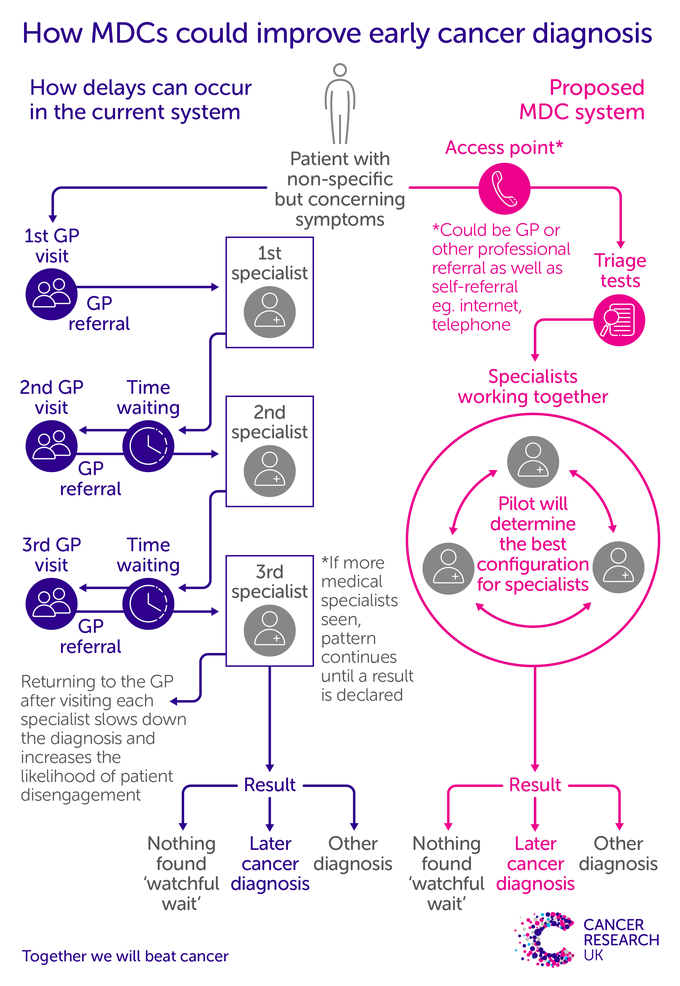Non-specific symptoms pathway

MDC Diagnostic tests report
Diagnostic approaches to cancer and/or non-cancer disease in five Multidisciplinary Diagnostic Centre (MDC) projects in England
Patients who present with non-specific symptoms (or combinations of non-specific symptoms) that can indicate several different cancers currently don’t have an established effective referral pathway. As a result, these patients often go back and forth between primary and secondary care which can lead to delays in diagnosis, higher rates of late stage and/or emergency presentation and poorer outcomes for the patient.
The ACE Programme has built up evidence which outline pathway interventions and recommendations designed to improve the diagnostic pathway for these patients.
As part of our Wave 1 programme of work we evaluated 9 vague symptoms projects with different aims and objectives. The report can be found below. This work spawned our Wave 2 project cohort.
The vague symptoms projects were followed by focused non-specific symptoms activity in Wave 2, with 5 projects piloting Multidisciplinary Diagnostic Centre (MDC) based pathways. This has resulted in an emerging body of evidence and recommendations - all of which can be found below.
Describing the rationale for & benefits of a dedicated referral pathway for non-site-specific symptomatic patients.
Please watch our short narrated video.
Let us know what you think of the video by emailing the ACE Team here
This material is based on our 5 ACE Projects which became the focus of our Wave 2 activity. Here you can find the key learning and documents to date.
This paper published in the BJC summarises our first results from the MDC projects. Diagnosing cancer in patients with non-specific symptoms with an 8% conversion rate and demonstrating the diagnostic potential of a dedicated referral pathway for non-site specific symptoms.
First results from five multidisciplinary diagnostic centre (MDC) projects
This summary report highlights the key findings from the five MDC projects and draws together the learning gained from their implementation. It also includes an overview of data from the evaluation period.
Key Messages from the evaluation of the MDCs
This material is based on feedback from the projects and covers: timing, essentials to developing MDC plans, working with primary care, key data elements and operational challenges.
ACE Programme early learning leaflet
This document outlines the key findings from the qualitative evaluation carried out by the Policy Research Unit for Cancer Awareness, Screening and Early Diagnosis on behalf of ACE.
Qualitative Evaluation Summary
Full Report
The Multidisciplinary Diagnostic Centre (MDC) concept is similar to arrangements in Denmark where a patient can undergo several diagnostic tests in one location, often on the same day, leading to a faster diagnosis.
An MDC doesn’t have to be a new ‘centre’. Instead, it can be set up within an existing hospital or community setting and would supplement cancer specific diagnostic pathways.
MDCs can potentially be an effective way to support patients with non-specific symptoms who tend to present late, and to support GPs whom are often unsure of the appropriate referral pathway for non-specific symptomatic patients.
Download MDC infographic
Our animated video looks at the benefits of the MDC pathway from 6 different perspectives. It features the views of ACE team members who are assessing the effectiveness of the MDCs and clinicians who are working on the pathway, supporting patients with non-specific but concerning symptoms
The documents below have been created to develop knowledge of the MDC model for non-specific symptoms.
The distinguishing features paper provides a descriptive overview of project approaches to the MDC model within the five projects:
Distinguishing features of the MDC model
The design principles document identifies three models, as well as a set of overarching MDC design principles
This article addresses the challenges associated with achieving a full and rigorous evaluation of MDC cost effectiveness, before describing some of the practical approaches employed at a project level to understand pathway cost.
Project approaches to understanding pathway cost
The following article may be of interest to local commissioners and policy makers interested in implementing MDC-based pathways in their areas
An approach to building the local case for the MDC
This document lists the data items to be collected as part of the MDC evaluation. A full list is available upon request.
Airedale Wharfedale and Craven
The MDC pathway was designed for patients presenting with non-specific symptoms who need diagnosis and treatment or referral within a few days of presentation but do not necessarily require hospital admission.
Greater Manchester
The two MDC sites trialled a same-day ‘hot-reporting’ diagnostic service model, including provision for individualised health risks assessments, personalised behavioural change interventions, and health promotion services.
Leeds
The project was based on a virtual MDC concept within shared hospital diagnostic resources, with a primary aim to ‘improve patient experience and outcomes by getting the quickest, most accurate diagnosis for people with non-specific, concerning symptoms with GP suspicion of cancer’
London Cancer
The project piloted the MDC concept across five sites, including urban specialist and urban district general settings. The overarching aim of the project was to improve access to diagnostics, patient survival, experience and costs associated with cancer presenting with non-specific but concerning symptoms.
Oxfordshire
The pathway accepted patients aged 40 years and older (a population of approximately 345,000) for whole-body, low dose, contrast enhanced CT and broad panel of laboratory investigations as the first tests for all referrals. The overarching aim of the project was to improve the time to referral for testing and diagnosis for patients with non-organ specific symptoms who do not meet the national 2WW referral criteria.
These documents summarise our learnings from the ACE Vague Symptoms cluster in Wave 1, a series of projects aimed to explore ways of achieving earlier diagnosis of cancer for patients that are currently not served well by existing referral guidelines, processes and pathways. The pilots took place across August 2014 – March 2018.
Please see the Executive summary and Full Report from this cluster.
We're now on twitter.Join the conversation and follow us for news, updates and opinion. |
@CRUKHCPs |
Last reviewed
Understanding the challenges of timely referral in primary care for non-specific symptoms: the patients’ perspective
Our discussion with a patient panel on their attitudes and opinions on getting non-specific symptoms diagnosed.
Rare and less common cancers paper
How non-specific symptomatic referral can diagnose a broad range of less common cancers - with over 30 different tumour types diagnosed.
Diagnostic potential of a non-specific symptoms pathway
Our first results from the MDC projects published in the British Journal of Cancer

